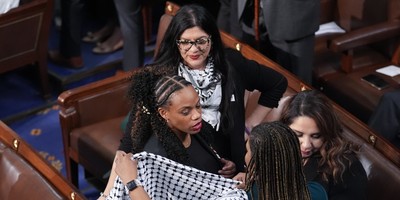Townhall Magazine investigates the challenges of talking about adoption to women in crisis pregnancies—and how the pro-life community should be handling it.
-------------------
Jackie Foote was neither the first nor last child her biological mother had—but the only one placed for adoption. Her birth mom, Mary, a Polish immigrant who moved to the U.S. during the Solidarity Movement, was single and in her late teens when she gave birth to Jackie prematurely. Since Jackie was only 4 pounds and having trouble breathing on her own, there was the very distinct possibility she would have respiratory problems for the rest of her life—a financial concern that weighed heavily on Mary, who worked at a steel mill in Cleveland. Fearing she wouldn’t be able to afford possible medical bills if this turned out to be the case, Mary made a decision that was in the best interest of both her newborn baby and herself.
“It was just so mature of her,” Jackie tells Townhall.
As was the case with closed adoptions in Ohio in 1985, it would be nearly 21 years before Jackie could receive information about her birth mother and the two finally met—an experience that made her particularly grateful to have been adopted.
Jackie is confident many of the opportunities she’s had in life would never have been possible had she not been adopted by her parents.
“I’ve done so many interesting things and I’m placed with a family who wants me,” she says emphatically, which is why, when Mary apologized to Jackie—not wanting her to think Mary was abandoning her—Jackie responded by thanking her for the decision she made.
“I’m so proud of my biological family,” Jackie says. “The fact that she [Mary] has her own family and made the right decision, because what if I did need a respirator for the rest of my life? She could have never paid for it, and that would have ruined our family.”
Recommended
Adoption, after all, is not abandonment; it’s a selfless and loving choice.
“Not only are you making it a better life for the child you place for adoption, but you’re making it better for a whole family,” Jackie says, adding that it was a blessing for her extended family, too. “I don’t look at is as ever giving up a child. You’re just putting them in a position where they have a lot of love and a lot of support with people who really, really want that child to be there.”
Jackie’s story typifies the adoption experience, and yet less than one percent of single women with unplanned pregnancies choose this option, according to Heroic Media, a pro-life multimedia organization. ...
Understanding the Mindset of Women in Crisis
Far too often the pro-life movement has failed to adequately advance the adoption option—the only life-affirming alternative available to women who may not be ready or capable of parenting. But this hasn’t been without reason.
As Heroic Media’s marketing director Marissa Cope explains, there’s a danger in simply pitting adoption against abortion.
“The knowledge within the pro-life movement has said that offering adoption to a woman who was abortion-vulnerable or abortion-minded can actually lead to a woman being further driven toward an abortion decision,” Cope tells Townhall.
The findings of a 1998 Vitae Foundation study on the psychology of pro-choice women are instrumental in helping understand why. The study titled “Abortion: The Least of Three Evils-Understanding the Psychological Dynamics of How Women Feel About Abortion” reveals that pro-life advocates have falsely assumed and therefore framed their arguments on the notion that women facing an unplanned pregnancy “will respond to principles we see as self-evident within our own moral framework,” Paul Swope, then Northeast director of the foundation, writes in the summary analysis. In other words, these women will not perceive their choice as carrying out the pregnancy or destroying the life of an innocent child.
According to the study, “unplanned motherhood ... represents a threat so great to modern women that it is perceived as equivalent to a ‘death of self,’” Swope explains—not a literal death, but that her life and self-identity in terms of school or her career, for example, will be over. “The sudden intrusion of motherhood is perceived as a complete loss of control over their present and future selves.” Even though the pro-choice women in the study know abortion is killing, and therefore morally wrong, the choice in their minds nevertheless becomes figuratively ending one’s own life or literally destroying the child’s.
Thus, to these women, abortion, as the study’s title suggests, is perceived to be the best of bad options. Adoption is seen as the worst—and it’s up to the pro-life movement to change that.
Truly Bad Big Business
Encouraging women to consider life-affirming options is not an easy task, however. Looking to fill their coffers, the billion-dollar abortion industry preys on the emotional vulnerability of women in crisis as a result of an unplanned pregnancy. They also offer a ‘quick fix,’ allowing the woman to regain control over her situation and purportedly resume life as normal.
But women are not informed of the very serious physical and psychological consequences of abortion, and the adoption alternative is not promoted as the positive, life-affirming option it represents for both mother and child— and neither is parenthood.
According to Planned Parenthood’s most recent annual report, the organization performed 333,964 abortions, provided prenatal care for 28,674 women and made only 2,300 adoption referrals. In other words, for each adoption referral, Planned Parenthood aborted 145 babies.
The concept of a ‘choice’ is entirely specious, and the reason is simple: abortion is big business.
Excerpted from Townhall Magazine's June feature, "Who's Afraid of Adoption?," by Leah Barkoukis. To read more of Barkoukis' report, subscribe to Townhall Magazine today.


























Join the conversation as a VIP Member